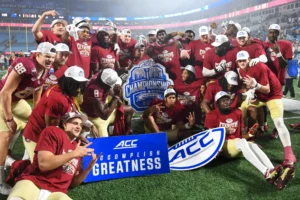College Football Playoffs: The inherent flaws in a system that rewards name over form
College football is an enigma. It is the oldest version of American football, and one that arguably sits closest to the hearts of the American people. Yet it is so fundamentally flawed.
Year after year there is consistent discourse over the College Football Playoff selection committee’s most recent choices. Debate will normally delve into which college team performed better in the regular season to justify selection. This year however has highlighted one major flaw: the committee itself.
Florida State Seminoles playoff snub is a ‘travesty’
Florida State University’s (FSU) perfect 13-0 season, which includes notable wins over state rivals Florida and the 13th ranked Louisiana State University, as well as the Atlantic Coast Conference (ACC) championship, was controversially snubbed in place of the 12-1 University of Alabama for the fourth and final playoff seed.

The committee has a remarkably tough job. There are 133 universities that compete in Division 1 of college football, and only four playoff places. There are often multiple top teams which have the same regular season record, that must be divided by the finest of margins. However, this was a serious mark of its incompetence.
In an interview with The Sports Gazette, USA Today’s University of Arkansas football reporter Jackson Fuller summarised the matter succinctly:
“It is a travesty. I’m not sure there is another sport in the world where a team can go undefeated and not have the opportunity to play for the championship.
“Alabama and Texas might be better than Florida State, but there’s zero tangible evidence supporting the committee’s decision outside of what they believe,” Fuller explained.
FSU are the only team in college football playoff history to have gone undefeated in a Power 5 conference and miss out. It speaks volumes about the method behind play-off selection.
Does losing one key player justify a whole team missing out?
In essence, the Seminoles were overlooked for the last playoff spot because of their star quarterback Jordan Travis breaking his leg in the penultimate game of the regular season. They were deemed to be a side so detrimentally handicapped without him that they were no longer worthy of a playoff spot.
All of this was in spite of the fact that both their backup and 3rd string QB were required to step up in their last two games against Florida and Louisville, with the latter being the ACC Championship game. They won both comfortably to close out their perfect regular season.
A fair comparison to emphasise the absurd nature of the situation is when NFL MVP frontrunner QB Carson Wentz was injured in week 14 in 2017, and the Philadelphia Eagles went on to win the Superbowl with backup QB Nick Foles. It is a team sport, and the supporting cast are just as valuable. To disregard that in the manner the committee did was widely viewed as a disgrace.
College Football Playoff format expansion to improve selection fairness?
Starting in the 2024 season, the college football playoff format will be expanded from four teams to twelve. There are some clear upsides to this move: teams like FSU will get the chance to play for the National Championship, and the multiple Bowl games involved will have more gravitas behind them.
The same fundamental flaws remain however, in particular the committee’s complete power over selection. While they preside over who makes the playoffs, controversy will continue to stir in the yearly debate. As well as this, the historic Bowl games not involved in the playoffs will effectively become redundant.
Speaking with The Sports Gazette, ex-NFL veteran Jason Bell’s lead analyst JP McGrath explained his thoughts on the new format:
“The regular season games will continue to not matter. Big name schools like Ohio State and Alabama will realistically now only have to win nine games to get into the playoffs.
“Their brands are too big, with too many star players, and too many potential viewers of the game not tuning in to watch for the committee to leave them out,” McGrath said.
Is the College Football Playoff committee unfit for purpose?
FSU being snubbed for the playoffs and replaced by Alabama really showed the true colours of the committee. Alabama plays within the South-Eastern Conference (SEC), arguably the best conference in college football consisting of some of America’s biggest sporting colleges. Alabama made the playoffs despite losing a game in the season.
The SEC has one of the two biggest TV contracts in NCAA football starting next year with ESPN. The Big 10, another top Power 5 conference, has the other. Out of the four teams who made the playoffs: Alabama is in the SEC, Texas is moving to the SEC in 2024, Michigan is in the Big 10 and Washington is moving to the Big 10 in 2024.
Broadcasters hedge their bets via conference coverage and thus have strong influence on the committee’s playoff choices when push comes to shove. McGrath explained the major issues regarding TV’s sway over selection:
“College football is run by TV executives. They have indelibly altered the fabric of college football because you have lost the best aspect; regionality.
“A team in Southern California will travel to Piscataway, New Jersey to play each other because schools can make more money in one conference, despite the fact its 1000 miles away, and it has led to the destruction of college football as we know it,” McGrath said.
Money is driving college football to a place not seen before. FSU are now suing the ACC in an attempt to leave the conference, due to the major financial differences in comparison to the SEC and Big 10. Their omission from the playoffs was the final straw, and could set a precedent for others in the ACC to follow in the same fashion. The future of college football will only continue in this manner unless there is drastic change.